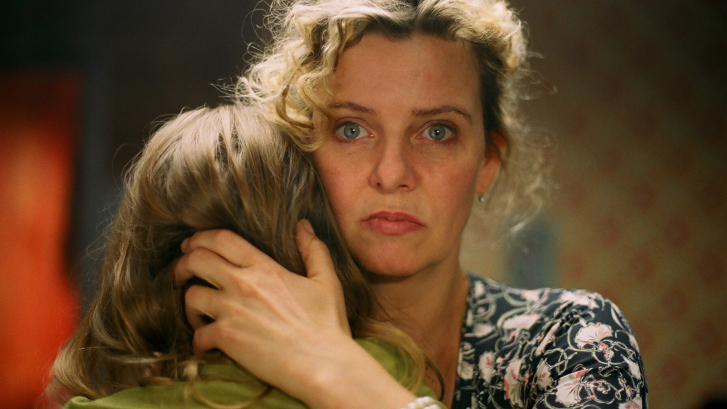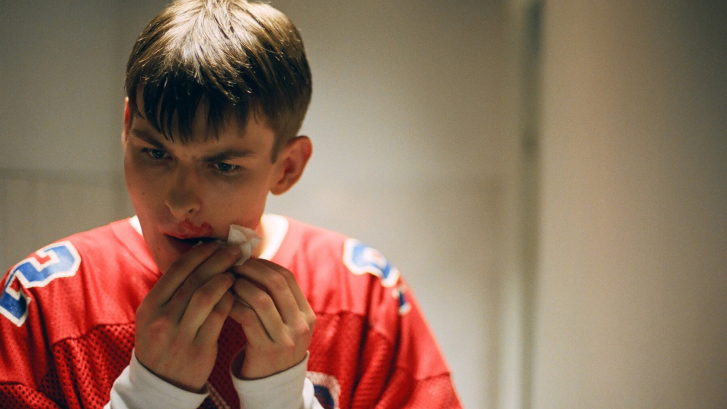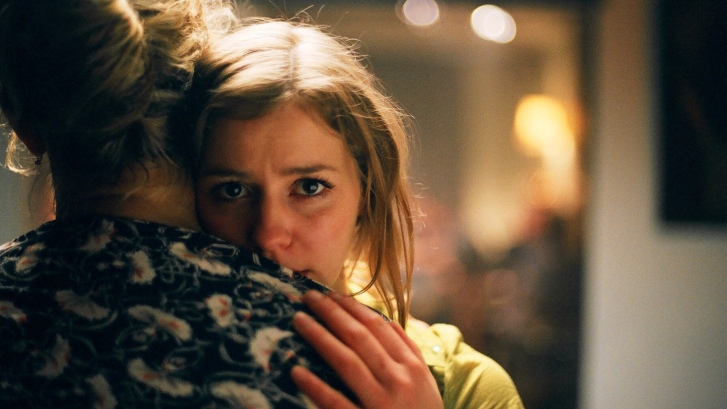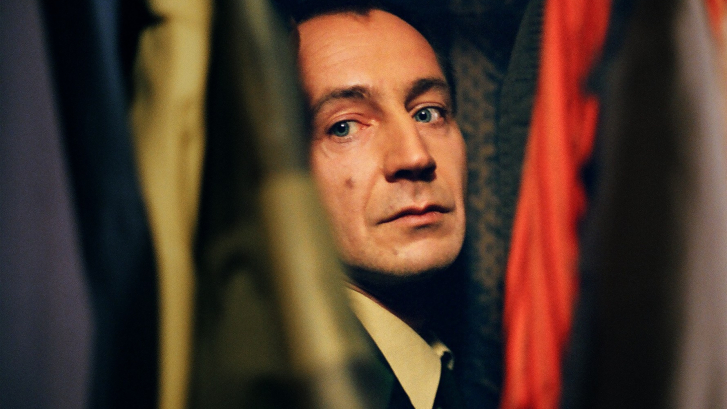Vier Fenster

What do we really know about the people we call family? What kinds of feelings, gestures and love affairs characterise the smallest unit of society? What might really be going on behind doors at the neighbouring family’s abode? These are the questions that preoccupy director Christian Moris Müller in his film. The four windows of the title refer to four chapters, each devoted to one of four individuals involved in a furtive search for happiness. The son meets a stranger who wants to kiss him. The father kisses his wife and thinks of his daughter. The daughter receives a kiss from the mother that’s like a slap in the face. The mother provokes a stranger’s kiss and hopes that her husband will lick her wounds. And yet, they all share a desire to belong and so they continue to cling to each other. But the price for their security is endless reticence. Christian Moris Müller approaches his characters with great care and without prejudice. In place of lengthy dialogue he allows their faces to do the talking. Long, unedited takes provide the actors with plenty of time and space to develop their characters. Christian Moris Müller: “I don’t like it when there are too many cuts. I find it very distracting and it ruins the moment. I wanted to give my four characters sufficient space to really take shape in the minds of the audience.” Müller’s technique works, due in no small part to the camerawork provided by cinematographer Jürgen Jürges, who has worked with directors such as Rainer Werner Fassbinder, Wim Wenders and Michael Haneke.
Short-Synopsis
They want to get away from each other, but they clasp each other even more firmly. They seek to save appearances at all force. The more they laugh, the quieter it gets around them. The cracks in the family picture widen until an inescapable secret reveals itself.
Interview with the director Christian Moris Müller
What is behind VIER FENSTER?
I wanted to look into the question of what family really means. On the one hand it’s a place of love and devotion and on the other one of abuse. I’m thinking of abuse of power structures. I wanted to observe the family that you occasionally meet in lifts and that you don’t normally learn much more about than what’s on the surface. I have tried to describe this surface very precisely and to ask about the relationships that are below that surface. Lastly it’s also about the longing for love and the longing to be touched. In the family there are firm structures within which everyone uses certain strategies in order to get love. Very often the very image of love is enough. We’re constantly creating these pictures of love. Actually I only examine this surface: the image of the happy family that is consistently honoured.
How did it come to this unusual narrative structure?
At the beginning there was the story of the son that I wanted to make as a short film. While writing this I realised that I was increasingly fascinated by the character of the mother. The relationship between the two became important. So I wrote down her story as well. She always talks about her husband who never appears. I found this exciting. What kind of life does he lead, away from his wife and son? With the daughter’s story everything then fitted together like a puzzle. It became a film about the relationships between the people. I wanted to show family as a complex system in which one can’t be described without describing the other. The power structures within the family are too entangled and expectations too high.
How is your work with the actors?
The work with the actors begins with the casting. For me it’s very important to find people I can develop something with. A technical approach can often be surprisingly helpful. When does a character stand up? When do the people look at each other? How are they arranged with regard to each other and to space? How long do moments of silence last? When does a figure breathe, and when does he/she stop breathing? I see these exterior events as a framework along which the actors find their way. Within this system they can move completely freely. I very much enjoy working on the rhythm of a scene. When a few bars have been clarified the others come about of their own accord. The most wonderful moment is when I notice that I have found the right language for each of the actors. This language is like a key that forever leads you into new rooms. This is when the shooting become a journey of discovery.
What brought you together with cameraman Jürgen Jürges?
I looked for him in the telephone book, called him and asked him if I could send him my script. One day later he called me back and said that he wanted to do the film. It was an awesome experience for someone to agree without even having made sure what the conditions of production are but instead allowing his decision to depend entirely on the script. Jürgen enquires precisely what story you want to tell. His images are the answer to these questions. The two of us have an kinship in visual language.
How would you describe the pictorial design of VIER FENSTER?
It’s a very direct visual language, focussed precisely on what’s important. I made a decision for long shots that were not cut in order stay with the characters for as long as possible. I have a problem with too frequent cutting. The viewer forever has to concentrate on a new picture and a new rhythm. This has a scattering effect and destroys the moment. Apart from that, it’s a visual language that takes very carefully into consideration: what can I see and what can’t I see? We often filmed people who reacted and less often those who acted. In listening faces there is often more to be read than in those that are talking. This has to do with our behaviour as humans. The moment we speak we take on a particular poise and begin to play a role. The direct reaction to this is more immediate and true.
Does VIER FENSTER have a happy ending?
Looking at it formally, the end is left open. But there is also a small prospect of change. It was important for me to recount this. The relationship between the daughter and son for me is the most hopeful. Between the brother and sister there isn’t this existential dependence that there is between parents or between parents and children. Then there is the possibility to initiate a dialogue. The end tells of two people who start talking. For me that is the start of the change.
Interview with Jürgen Jürges, director of photography
What was your first reaction to the script of VIER FENSTER?
What I found exciting was the style of how the film was made, filming shots that lasted very long. After first talking to Christian I noticed that he knew exactly what he wanted. He showed such great motivation and enthusiasm that it was clear to me that we would get on.
Isn’t it unusual for you to take part in a small film like that?
Not at all! The instant a story appeals to me it doesn’t matter what sort of film it is. I have no problem with making cuts in the technical area. I don’t care whether it’s shot in mini format or cinemascope. What’s important to me is the story. I do a tremendous amount of filming and have plenty to compare with. It was a great job that also made sense. I hope that this is reflected in the film.
It was your first shooting on DV...
For years I tried to ignore digital media. But last year I filmed using digital (on HD) for the first time and that helped me lose my fear of it. I was able to learn some of the advantages these formats have. DV reacts similarly to HD. On an upward light-scale it burns out very quickly but on the other hand has much more leeway in the darker areas. We were able to make good use of this in VIER FENSTER. All rooms had closed curtains for dramaturgical reasons; this meant that the contrast scale was not very high and I had the lighting in my own hand. I saw the first exposure on 35mm and was positively surprised.
Interview with Philipp Budweg, producer
How did the project of VIER FENSTER come about?
I met the director Christian Moris Müller when I saw his first film UNTER DER ERDE (UNDER GROUND). I liked the film a lot because it had a very developed imagery language; it observed people very exactly and drew a very personal picture of society. Christian is someone with a vision who is not scared of experimenting. This had me curious we were soon talking about doing a project together. In autumn 2003 he gave me his first script version of VIER FENSTER to read. It consisted of four short films that gradually became one longer film in the course of the script’s development. With the final script we were then able to convince the board of the First Production Programme (FPP) to sponsor us. This laid the foundations for realising the project. In February 2005 we were then able to begin filming in Berlin.
Why did you decide to produce VIER FENSTER?
After reading the script for the first time it was already clear to me that VIER FENSTER would be a completely unusual film. A film with the potential to polarise its viewers, to incite discussions and challenge the audience. It offers a broad surface for reflection that leaves much space for individual interpretation. Every viewer will see this film differently! The film leaves enough space for people to integrate their own experiences and can provide an impulse to think about oneself. That’s what makes it so exciting! VIER FENSTER is not a film to be merely consumed and quickly forgotten. There are such strong moments in the film that don’t let go of you and stay in your head for a long time. I think it’s great when a film achieves that.
Interview with Theresa Scholze (plays the daughter)
What interested you personally about VIER FENSTER?
When I first read the script I wondered whether I really had read the story I thought I’d just read. The story is not told in bold and straightforward terms but takes place in the head. I had to read a few things again. But then it was the way I had thought it to be after all. In the script you have the feeling that it’s just the tip of the iceberg, and yet it still tells such a lot about what lies below. That was very appealing.
How do you see the daughter’s relationship to her father?
That is a subject submerged in taboo. The fact that fathers commit immoral acts with their daughters is something you hear about. But the idea of both of parties wanting it – I can’t really relate to that. You start to wonder which of the two started it all. Probably the father. How much does it have to do with the relationship to the mother? Or with feeling unloved? The daughter cheats on her boyfriend without batting an eyelid. She can’t fight it even though she’d like to. And then she just does it as though it were completely normal. No one talks about it. It will all pass over. She doesn’t see it as a problem. It’s gone too far for that. But she does know, of course, that it’s wrong. This creates this latent pressure and the latent unhappiness under which anyone would break down with time.
What effect do you feel the film has?
I think the film is quite brutal without being violent. It’s a kind of everyday brutality that takes place constantly. The problem of not talking about things that are quite obviously present affects very many people. I hope that the film manages to get people to face the truth and to begin thinking about it.
Interview with Thorsten Merten (plays the father)
What interested you personally about VIER FENSTER?
I started reading the script and after the first few pages I thought “What rubbish”. But as I went on reading it got more and more exciting. This has to do with the way the film is put together. The fact that it isn’t fully explained but rather takes place in the head. Then I read it again. I’d never come across a script like that. I just had to do it! I saw it as a great adventure.
What kind of person is the father?
I pictured him as someone who had once enjoyed life. And as is often the way in relationships he gets into an idle state, a rut, and can’t find a way out. The only enjoyment he gets is from his daughter. And he can’t find a way out and doesn’t want to go without this enjoyment. I think that the father is an imaginative type, but he doesn’t know what to do with his creativity so he lives in a world of his own. He can’t solve a lot of his problems and doesn’t even try to. Apart from this he’s jealous, just like all fathers when the daughter becomes independent. This is not only a father’s jealousy but also that of a lover.
How did you prepare yourself for the role?
First I try to give my character a lot of quirks and peculiarities. Then, one day before we started shooting, I thought: these are just completely normal people, so I started wondering how I would behave in a situation like that. This is my way of putting together characters without great trauma. The traumatic part is the circumstances and not the characters themselves. Nonetheless, I still wanted to try to avoid constantly playing these onerous and depressing situations, these oppressive nightmares. I also try not to put myself into these characters psychologically; otherwise you’d end up needing therapy after every film.
Interview with Margarita Broich (plays the mother)
What interested you personally about the story?
I found the story exciting, but I was a bit concerned about it being so straight and without frills. It has a tremendous bleakness about it that you find yourself wanting to break, but which you’re not allowed to break. You really have to be a bright old soul in order not to become completely sad and depressed.
How would you describe the character of the mother?
The mother is simply the mother. I’m a mother, too. Sometimes I’m shocked at how little you’re aware of what goes on in your children’s lives despite them being so close. There are many muddled and sometimes tragic situations. Much of this has not even reached the mother’s final nerve centre; otherwise she wouldn’t be able to go on as she does. Many things are just put away before being looked at for too long.
How was the shooting?
The filming was intoxicating for me, certainly not grim but if anything fulfilling. Christian had quite a clever way of putting you on a tightrope. It was a straightness he didn’t demand from you; instead he built it up slowly. You really felt like expressing things using nothing or just a bare minimum. This continued to grow on me during shooting. I trusted Christian from the beginning.
What effect do you think the film will have on its viewers?
The long shots are quite a provocation. The camera seeks out the character like a sniffer dog, rather than jumping to and fro. This completely upsets what our vision is accustomed to, but the effect really is amazing. You remain fixed to the individual destinies while frightening moments of stagnancy can be read in their faces.
Interview with Frank Droese (plays the son)
How would you describe the character of the son?
I’d describe him as someone quiet. I took quite a bit of it from my own character: He lives in his own world, dreams a lot, spends a lot of time on his own and just does his own thing. He mostly feels shut out from the rest of his family and from his own people. That’s why he goes off on his own and does his own thing upon his own initiative.
What was the most difficult scene for you?
The most difficult scene was the one where I was sitting on my own in a sex-shop cubicle. Christian kept saying: Frank, flirt with the camera. Fuck the camera! At that point I had a mental block and just seized up. I didn’t manage anything on that day. I found it really difficult to flirt with the camera. I don’t normally flirt with cameras.
There were some scenes that could be described as difficult...
In my very first film I found it really awful to kiss a woman. Then I did it, and it was perfect, nothing to it, I’d do it again and again. But now I had to kiss a man. That was weird because Ole Puppe was covered in a scratchy beard. But it was good thing that he was also straight. I’ve got nothing against gays, on the contrary, but if the other actor had been gay, well, I don’t know. But I got on fine with him, it was funny. During the casting I wondered to myself: Shall I do it or not? But then I thought: Just get through it, do the scene and then everything will be okay.
Why did you decide to play the roll?
Because the roll was a challenge for me. Firstly because I’m familiar with the situation from my own family. Whenever we went out to dinner as a family we were the greatest family in the world to look at. But in reality we only ever argued and rowed. And secondly because I don’t want to play the same rolls the whole time. I thought that this would be my chance to do something completely different. And it was worth it in the end.
details
-
Runtime
80 min -
Country
Germany -
Year of Presentation
2006 -
Year of Production
2005 -
Director
Christian Moris Müller -
Cast
Thorsten Merten, Margarita Broich, Theresa Scholze, Frank Droese, Ole Puppe, Sandra Nedeleff, Alma Leiberg, Stephan Lewitz, Lina Schuller, David Behrens, Christoph Konopatzki, Jean Denis Römer, Karl-Heinz Thinius, Werner Wilkening, Friedrich A. Holm, Franca Schuller -
Production Company
Schlicht und Ergreifend Filmproduktion -
Berlinale Section
perspective german cinema -
Berlinale Category
Feature Film
pictures from the movie
Biography Christian Moris Müller
He studied ballet at the Heinz Bosl Foundation in Munich. After studying communications- and fashion design, he attended courses in drama and stage directing in New York. He began attending the Munich College of Film and Television in the year 2000.
Filmography Christian Moris Müller
2002 Unter der Erde | 2015 Lichtgestalten


